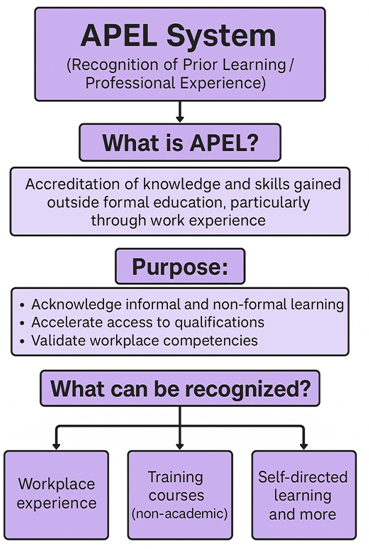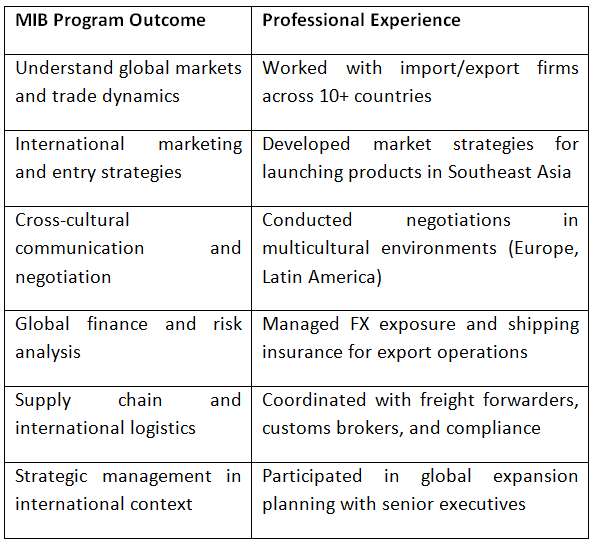MIB and APEL (Accreditation of Prior Experiential Learning)
Enter a MIB without a bachelor’s degree. Validate your real-world expertise

APEL (Accreditation of Prior Experiential Learning) is a formal process that allows candidates to gain access to a academic degree (such as an MIB Master in International Business) or receive academic credit based on their professional experience, workplace learning, and informal training—even if they do not have a conventional academic background (like a bachelor's degree).
Advantages of APEL for MIB Master in International Business
- Enter a MIB Master in International Business without a bachelor’s degree
- Validate your real-world expertise
- Save time and tuition through credit exemptions (where allowed)
- Gain academic recognition and career advancement opportunities
Master in International Transport and Logistics.
Master in Transport in Africa.
Master in International Business
What can be recognized?
- Workplace experience
- Voluntary work
- Training courses (non-academic)
- Self-directed learning
- Life experience relevant to a field of study or profession

Purpose:
- To acknowledge informal and non-formal learning
- To accelerate access to qualifications or degrees
- To validate workplace competencies for career advancement or requalification
- To support lifelong learning
APEL is a process that allows individuals to gain academic credits, certifications, or access to further studies based on their previous learning and professional experience, without having to repeat what they already know or can do.
APEL allows individuals to demonstrate their competencies through assessments like portfolios, interviews, or practical demonstrations, which are evaluated against specific academic or professional standards. APEL is often used in higher education or professional qualifications to provide flexible pathways for learners to achieve formal recognition without repeating learning they’ve already acquired.
It is part of what is more broadly called Recognition of Prior Learning (RPL) or Recognition of Prior Learning and Professional Experience.
International Equivalents:
- UK: APEL / APL (Accreditation of Prior Learning)
- France: VAE (Validation des Acquis de l’Expérience)
- USA/Canada: PLA / RPL (Prior Learning Assessment)
- Australia: RPL (Recognition of Prior Learning)
- Spain/LatAm: Reconocimiento de Aprendizajes Previos (RAP) / Acreditación de la Experiencia
- Portugal, Brazil, Angola...: Reconhecimento de Aprendizagem Prévia (RAP)

How APEL Applies to the MIB Program
1. Admission Without a Bachelor's Degree
If you’ve worked for several years in roles related to International Trade, global marketing, export/import, or international supply chains, you may be admitted to an MIB without a formal undergraduate degree, provided your experience matches the program’s entry requirements.
Examples of qualifying roles:
- Export/import manager
- International sales executive
- Trade compliance officer
- Global logistics coordinator
- Business development manager for international markets
2. Exemption from Certain Modules (In Some Programs)
APEL can be used to:
- Skip or get credit for certain subjects (e.g., “Logistics” or "Cross-Cultural Management")
- Shorten the duration of your MIB
This is usually assessed through a portfolio submission, interview, and sometimes a reflective essay.
APEL Requirements for MIB Admission
Here’s what you’ll typically need to submit:
- Personal Statement: Why you want to pursue an MIB, and what you bring from your experience
- CV / Resume: Detailed work history, especially in international contexts
- Evidence Portfolio: Letters, reports, certifications, contracts, etc., proving your experience
- Learning Reflection: Essay Explains what you’ve learned from experience and how it relates to the MIB
- References: From managers, clients, or colleagues familiar with your international work
APEL Portfolio for Master’s in International Business
Here is a sample APEL (Accreditation of Prior Experiential Learning) portfolio outline for someone seeking entry into a Master’s in Internation Business based on their professional experience, without a formal bachelor's degree:
Applicant Name: [Your Full Name]
Program: Master’s in International Business (MIB)
Institution: EENI- Global Business School
Date of Submission: [DD/MM/YYYY]
1. Personal Statement / Motivation Letter
Purpose: Explain your goals, career journey, and why you're seeking admission via APEL.
Include:
- Your career background in International Business
- Skills and knowledge gained through experience
- Why you want to pursue an MIB
- Why you’re applying via APEL
Examples:
1- “With over 9 years of experience in International Trade—mainly in Latin America and Southeast Asia—I’ve developed strong competencies in cross-border negotiations, market entry strategy, and intercultural business communication. My roles have spanned export sales, trade compliance, and global partnerships. Although I do not hold a formal undergraduate degree, my work has exposed me to real-world International Business dynamics. I’m now seeking academic structure through the MIB program to enhance my strategic perspective and transition into Global Business development leadership.”
2- “I have spent over 12 years in the logistics and supply chain industry, progressing from warehouse coordinator to operations manager. Though I do not hold a formal degree, I have managed multimillion-dollar contracts, led cross-functional teams, and completed multiple executive trainings. I now seek to consolidate this experience through a structured Master program to grow into a strategic leadership role.”
2. Curriculum Vitae (CV)
Include:
- Work experience (titles, dates, locations, responsibilities)
- Languages spoken
- Certifications or non-formal learning
- International projects or regions handled
3. Mapping Your Experience to MIB Learning Outcomes
Provide a table linking real-world experience with academic learning
outcomes. Example:
Learning Outcome | Your Real-World Experience
-----------------|-----------------------------
Understand global trade | Managed trade contracts with LATAM clients
Multicultural leadership | Led international teams in Europe and Asia

4. Evidence Portfolio
Include supporting documents such as:
- Employment letters
- Reference letters
- Certificates
- Project reports or presentations
- Business documentation (with confidentiality respected)
Examples:
1. Letters of employment (on company letterhead)
2. Client contracts or trade documentation
3. Training certificates (e.g., Incoterms, WTO trade law, etc.)
4. Evidence of business expansion (sales reports, partnerships)
5. Conference attendance or speaking engagements
6. Awards or internal recognition
5. Reflective Essay / Learning Narrative
A written reflection showing what you learned from your experience, not just what you did.
Structure:
- Introduction: Summary of your experience
- Key Lessons: Insights or skills gained
- Real Projects: Case examples
- Why Study Now: Importance of formal education
- Future Goals: Career trajectory
Example Excerpt:
“Working with distributors in Brazil and Indonesia, I learned to adjust not just pricing or logistics but also brand positioning to local market sensitivities. While managing regulatory hurdles in customs clearance, I deepened my understanding of trade compliance frameworks. These experiences taught me the critical role that cultural fluency and policy knowledge play in international business success. However, I now seek to enhance this knowledge with academic tools—such as international finance modeling and strategic frameworks—that I didn’t acquire formally.”
6. References / Endorsements
Include 2–3 letters from:
- Former employers
- International clients or partners
- Business partners you've collaborated with
- Mentors or professionals who can validate your growth and international
perspective
Optional: Additional Documents
May include:
- Proof of language proficiency
- Certificates from MOOCs or online programs
- LinkedIn profile or digital portfolio
Fees
The candidate must submit this document for evaluation to EENI. The evaluation fee is 100 Euros. If the candidate is accepted to study the Master's program, this amount will be deducted from the total tuition fee. If the candidate is not accepted, this amount will NOT be refunded.
Payment methods: Online, Western Union, or Bank Transfer.

(c) EENI Global Business School (1995-2025)
Top of this page









 WhatsApp
WhatsApp